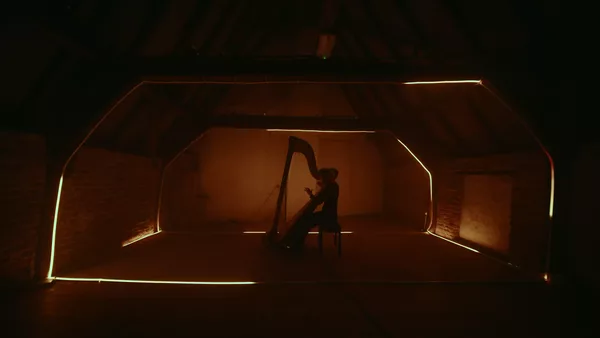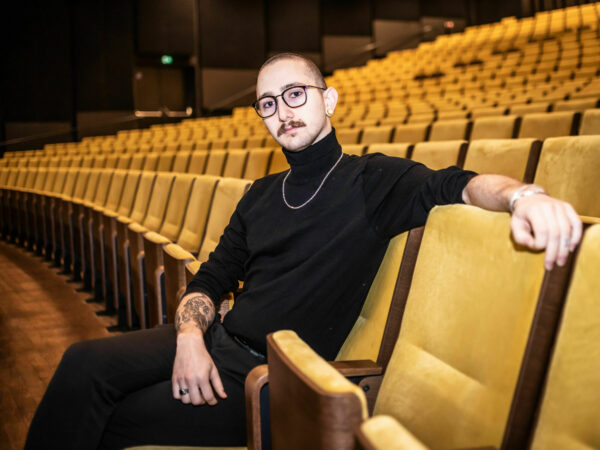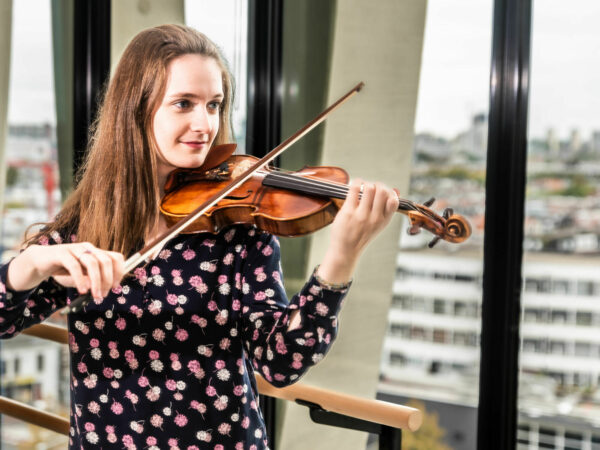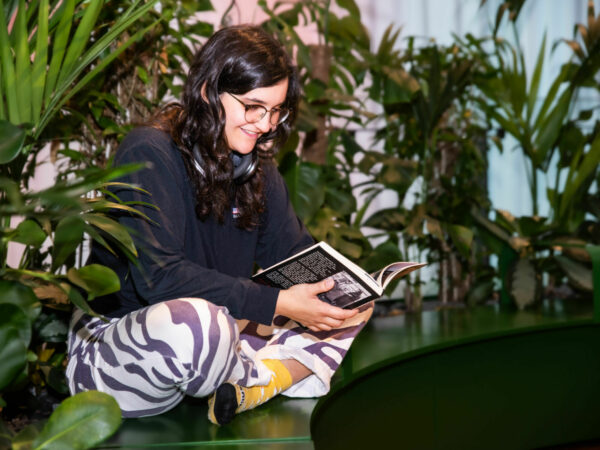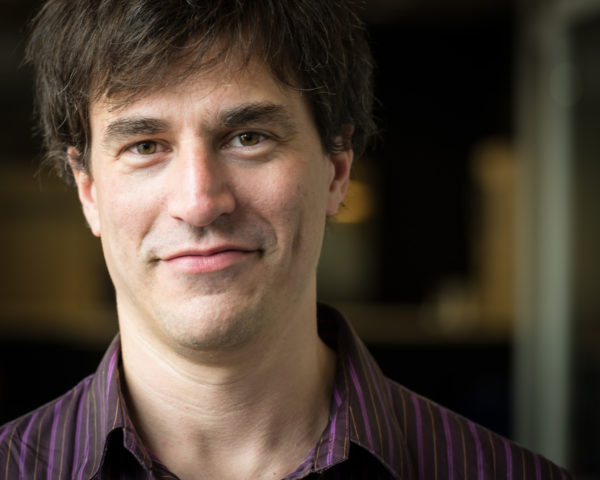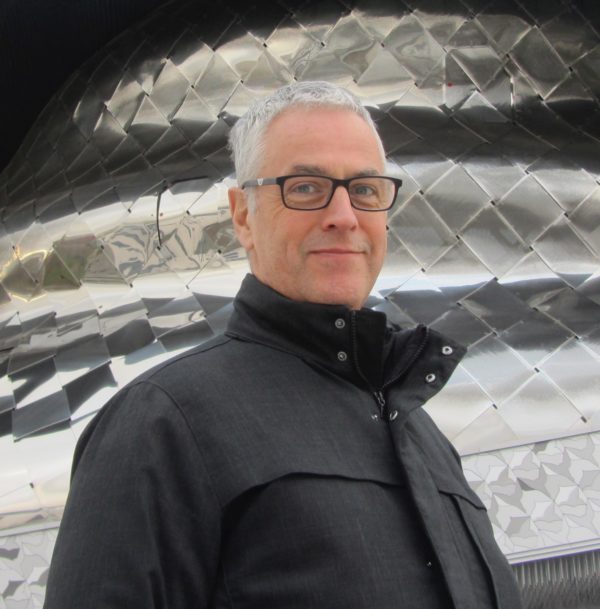The De Zaaier Foundation is a small capital fund founded in 1985 by Mrs. Dieuwke Honig-Prager. The emancipation of the individual and the promotion of sustainable development are central to De Zaaier’s philosophy. Next to their developmental work, De Zaaier has reserved a percentage of their funds for the support of research in the arts, which in the past has largely been for PhD research at Leiden University.
This Autumn, the board of De Zaaier approached Kathryn Cok, Head of Master Research, to enquire if they could provide financial support for Master Research students here at the Royal Conservatoire, as they are particularly interested in the interaction between music and science. The wonderful result of the discussion that ensued is that seven of our first year Master students will receive financial support for their research, based on a research proposal that they submitted as part of the Master course: Introduction to Research in the Arts. The students selected represent various departments of the Conservatoire and De Zaaier was impressed with the diversity of our student body and the originality of the research proposals submitted.
The Master Research Department is sincerely thankful to De Zaaier for their support of our students, especially at this challenging time, and offers our warmest congratulations to: Rafaele Andrade, Sean Bell, Georgia Burasko, Minke Kullberg, Blanca Leticia Martin Munoz, Julia Pallanch and Michelle Pritchard. These seven students explain more about their Master Research below.
'I applied for a scholarship of Stichting De Zaaier to continue my research of creating an interactive instrument. Without their support, it would be difficult and limited: the testing of the prototypes of the best design, manufacturing, software and materials for music production involved on this research. Finally I will be able to do a version with recycled Carbon Fiber filament (locally produced in Amsterdam), order good and sustainable cello strings and test the best sound qualities that 3d printing techniques could offer to music production.
This research just needs a small kick of resources to be able to bring a new vision of sustainability and fair label conditions for musicians into our conservatoire. To design and explore technologies of production and performance is to stimulate new methods for sustainability and dynamism in industry and directly enlarge possibilities of music education of future generations.
Thanks De Zaaier for believing on the message of Knurl!'

'My research is focused on the creative development of an artistic stage performance, combining operatic music by G.F. Händel with contemporary performance art, and through this, combine the duality in me as a performer. The application for the grant from De Zaaier was a perfect opportunity to develop my project and to communicate my creative ideas. A major part of my work will be experimenting with the repertoire in different contexts: electronics/sound design and dynamic visual elements. With De Zaaier's support I will be able to realise these experiments, and continue crossing borders between baroque music and contemporary expression.'

'I applied for funding from Stichting De Zaaier because a central component of this project is to make Händel’s music, in this case Neun Deutsche Arien, relevant and accessible to a broader audience in the form of a podcast. In order to achieve this successfully, it is important that I create a well researched and highly produced product. This funding will help me to cover travel and production costs required for my research and recording of this podcast. I am so grateful to be given this support and look forward to sharing my work with you in 2022!'

'The possibility of financial support allowed me to dream bigger than just finishing at the Masters-presentation. It is a stepping stone to sharing the outcome of this comparative study with other professionals in the field.
As a music educator in primary schools and working closely with primary school teachers, I have recognized that many musical activities in early primary school education tend to use similar aural activities as in phonological awareness training. Former studies have shown that a music program is good alternative approach to training phonological awareness. In my masters study I will be comparing music programs for aural training to language programs for phonological awareness and I expect to find similar musical elements, such as pitch, rhythm and timbre, and similar aural activities, such as inner hearing or imagination of sound. From these findings I will create musical activities to train phonological awareness, following the learning curve from Sound to Symbol. With the support of Stichting De Zaaier I now have funds to make a professional instructional video-series! With this study I will be contributing to research-based cross-curricular education, so that time becomes a less limiting factor. More time for music, more inclusion in regular primary school education. Just as Kodály said: Music should belong to everyone, not just the elite!'

'The reason why I am applying for this grant is to be able to rent the instrument on which my research project is based. Since it is an uncommon instrument, the basse de violon has few extant instruments that have arrived until now, making the research harder as some of the critical aspects on the matter depend on it, e.g. its playability. Through this instrument, I hope to answer certain questions using them to develop the basse de violon acknowledgment in the proper nature, use, and status of this particular instrument.'

'My artistic path has led me somewhere in between Kunstlied and Jazzstandard, in between classical music und jazz. I dedicated the past eight years on the adaption and reinterpretation of the Romantic Kunstlied of Schubert’s Winterreise, Schumann’s Dichterliebe and Brahms' Lieder and even though I’ve been working on exploring similarities and boundaries within these genres for a while now, I still feel that I’m just at the beginning and that there is so much more left to discover. I’ve felt the need to capture my experiences and put them in a broader, more theoretical context for a while now and that is one of the main reasons why I applied for this Master programme and through it had the chance to apply for the financial support of the Stichting De Zaaier. To me, time and space are essential parts of research and artistic development and through this financial support I gain exactly that: more time and space to dive deeper into the field of my artistic research and for that I’m very grateful. I’m excited to share, reflect and document my experiences and my hope is that by finding similarities and exploring boundaries on the turf between two genres mutual understanding and appreciation could be fostered between different approaches of interpretation.'

'As a master student at the Royal Conservatoire, The Hague, I am incredibly grateful to receive the financial support from De Zaaier for my research. My research involves investigations into the emergence of the viola (late 19th Century) to present day and the discovery of lesser-known works that best illustrate the changing role of the viola. As well as utilising online platforms, I will be travelling to the Nederlands Muziek Instituut several times as I delve into relatively unknown repertoire. I will subscribe to the Dutch Viola Society as this is a good platform for repertoire resources, interviews and performance information. I have several interviews I wish to conduct with experts in The Royal Conservatoire, The Hague. Visiting the Kunstmuseum Den Haag, its instrument collection and musical iconography will shed further light on factors that gave rise to the viola's emergence. The Research Grant will be used for travel costs, subscriptions and entry fees- I am a resident in Middelburg and will be travelling often as a result.
The purpose of my research is to develop a further understanding (through both theoretical and practical means) the role of the viola today and the responsibility of the classical violist especially with regards to how we can effectively generate, expose, promote and contribute to the viola into the future. I will then utilise this research and curate and perform in lecture-recitals with the aim to producing recordings of these lesser-known works and thus reaching a wider audience.'
